Cannabis Market Summary
The global cannabis market size was valued at $25.7 billion in 2021, and is projected to reach $148.9 billion by 2031, growing at a CAGR of 20.1% from 2022 to 2031. The main reasons why the industry is predicted to grow are the rising legalization rates for cannabis and the acceptance of its use in the medical community.
Key Market Trends and Insights
Region wise, North America generated the highest revenue in 2021.
The global cannabis market share was dominated by the recreational segment in 2021 and is expected to maintain its dominance in the upcoming years
The balanced THC and CBD segment is expected to witness the highest growth during the forecast
Market Size & Forecast
- 2021 Market Size: USD 25.7 Billion
- 2031 Projected Market Size: USD 148.9 Billion
- Compound Annual Growth Rate (CAGR) (2022-2031): 20.1%
- North America: Generated the highest revenue in 2021
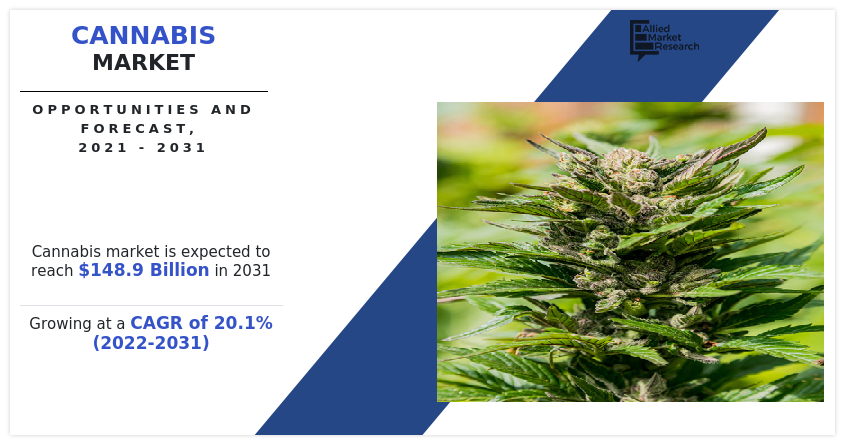
Market Dynamics
Cannabis, popularly known as marijuana, is a herbal medication made from plants in the Cannabis species that is used to treat a variety of symptoms and diseases, including cancer, chronic pain, and mental disorders. Tetrahydrocannabinol (THC) and cannabidiol are the two main cannabinoids derived from this plant that have medicinal uses (CBD).
Several regulations have been put in place by the FDA, and work is being done on new laws that will legalize and control cannabis use. The consumer base of the businesses involved in the manufacturing and distribution of cannabis and associated goods has grown significantly, which is encouraging investors to increase their investments. The medical applications of cannabis and the best ways to consume it safely are the subject of additional research. This means that throughout the upcoming years, the cannabis market as a whole is anticipated to develop gradually.
Although it has been used for centuries, cannabis is not often employed as a first-line therapy. Cannabis is now used for a number of purposes as a result of research into its potential therapeutic uses. Chronic pain sufferers and those who experience chemotherapy-related nausea have found considerable relief from their symptoms using cannabis as a medicinal. Despite being authorized in more than two-thirds of states, it is still categorized by the U.S. Drug Enforcement Administration as a Schedule I drug.
The industry has expanded as a result of a steady increase in the legalization and legitimacy of cannabis for therapeutic purposes. The cannabis market demand for medical cannabis is booming, and so are the number of authorized and certified purchase choices. The FDA has approved CBD-based medical cannabis products for treating chemotherapy-induced nausea and epilepsy seizures. Based on research being done on the effectiveness of medical cannabis and its derivatives for a variety of conditions, the FDA has decided to take into consideration categorizing cannabis from a Schedule I drug to a Schedule II drug.
Legalizing cannabis is frequently viewed from two perspectives, and it has consistently been resisted due to fears of abuse. People are now able to use drugs safely and are also aware of cannabis's therapeutic benefits because to its legalization. Customers are primarily over the age of 50 in the U.S. provinces where cannabis is legal. This demographic profile is anticipated to increase demand for cannabis in the country because of the increased likelihood of chronic diseases after the age of 50 and cannabis' efficacy in treating such conditions. However, the use of cannabis for a variety of purposes is legal in 30 states in the U.S.
Complex legislative framework for cannabis use is one of the main issues limiting cannabis market expansion. Globally, different regulatory requirements must be met by businesses selling cannabis and items infused with the drug. Manufacturers and stakeholders may find it challenging to adhere to the strict regulatory standards governing the cultivation and distribution of cannabis across national borders. Additionally, the use of cannabis is governed by laws that differ from nation to nation, which further restricts the expansion of the global market.
There is a significant chance for the introduction and legalization of cannabis in Asia Pacific as the majority of nations in North America, Europe, and South America have done so. As one of the main markets for industrial hemp, New Zealand is anticipated to develop into a viable market for industrial cannabis. In addition, a number of important businesses in the cannabis sector are anticipating significant growth in the market for cannabis use in Asia-Pacific as a result of legislative developments in that region. Several nations in the region may also be potential low-cost, highly productive cannabis producers. Thus, it is projected that all of these variables working together would present profitable prospects for the growth of the global cannabis market during the forecast period.
Around 20 states in the U.S. have legalized medical cannabis, and several other nations have now passed legislation decriminalizing its usage. Among the few countries that came before its legalization were Africa, Europe, Australia, and South America. Strict regulations on the sale and distribution of cannabis and associated items accompany this. The decriminalization of medicinal marijuana is currently being debated in other parts of Europe, but it has already been approved in other European nations. Although South American nations are warming up to cannabis, buying and selling the drug is still prohibited. The Middle East and Asia are the continents with the lowest legalization and acceptance rates.
However, thousands of individuals in North America and Europe consider it is a successful medication for treating a range of chronic ailments. Regarding its intoxicating effects regardless of THC content, there is a myth. Due to the presumption that it can only be absorbed by smoking, it is not widely accepted as a medical treatment. While it can also be taken orally, topically, orally vaporized, eaten, smoked, or applied topically as patches. The proper positioning of cannabis-based medical treatments is required to overcome these obstacles, and efficient marketing methods are required.
An enormous possibility exists for the introduction and legalization of cannabis in the Asia-Pacific area as the majority of nations in North America, Europe, and South America have done so. It is anticipated that China, which is already a significant market for industrial hemp, will also become a significant market for industrial cannabis in the near future. As the legislative framework in the Asia-Pacific region develops, many influential players in the sector are waiting with bated breath for the chance it will bring. Numerous nations in the region may have the capacity to create a large number of products at low cost.
Segmental Overview
The global cannabis market is analyzed on the basis of product type, compound, application, and region. By product type, the cannabis industry is divided into buds or marijuana flower and cannabis extracts. By compound, the market is divided into THC-dominant, balanced THC & CBD, and CBD-dominant. By application, it is classified into medical, recreational, and others. Region wise, the cannabis market is analyzed across North America, Europe, Asia-Pacific, and LAMEA.
By Product Type
The cannabis extract segment, as per product type, dominated the global medical cannabis market size in 2021 and is anticipated to maintain its dominance throughout the forecast period. This is due to factors like the rise in popularity of cannabis extracts like oils and tinctures, the legalization of marijuana for the treatment of various chronic diseases, and new cannabis extract product launches.
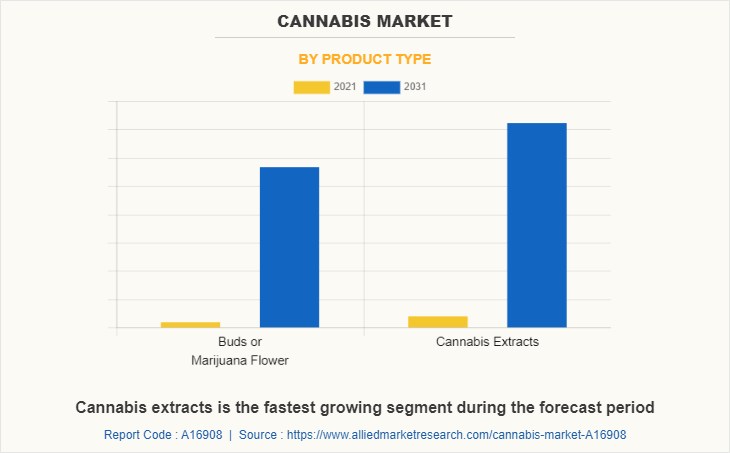
By Compound
The balanced THC and CBD segment dominates the global cannabis market. A balanced strain has a balance between the concentrations of CBD and THC. The ratio of CBD to THC in a balanced product is therefore 1:1. For its consumers, the psychoactives' combination produces a distinctive sensation and impact.
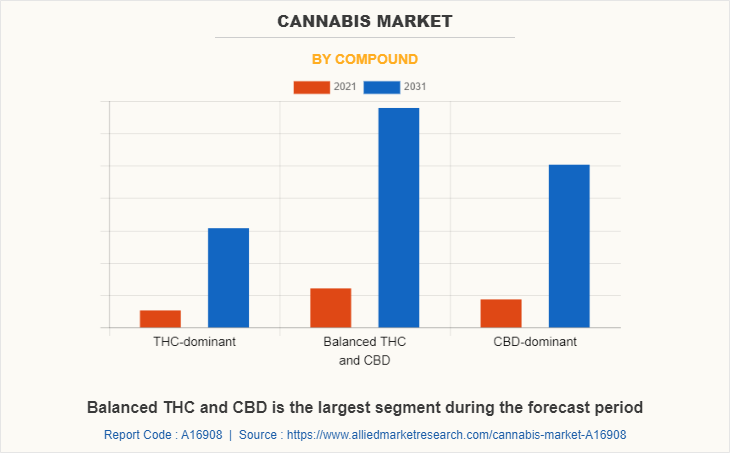
By Application
The recreational segment exhibits the fastest cannabis market growth in the global market. One of the main factors influencing the market place is the government's accelerated pace of legalizing marijuana cannabis for both medical and adult-use or recreational usage.
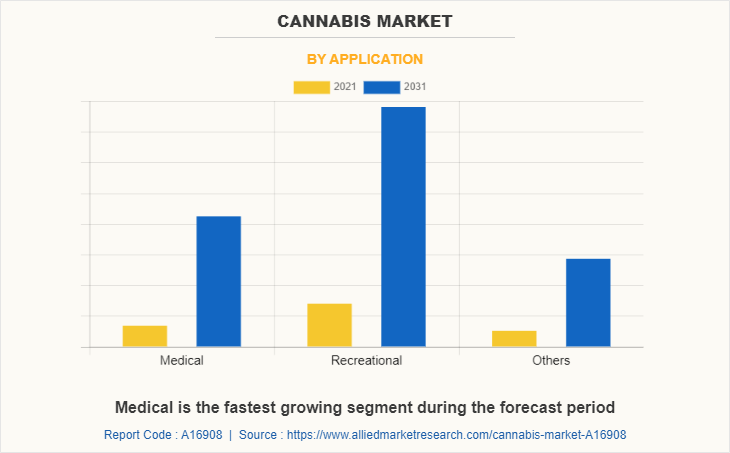
By Region
Region wise, North America dominated the market with the largest market share during the cannabis market forecast period. Due to an increase in R&D activities for drug discovery using medical cannabis, an increase in the incidence of chronic diseases like cancer and osteoarthritis, and an increase in awareness about the advantages associated with medical cannabis, North America presents lucrative opportunities for key players operating in the market, thereby registering the fastest cannabis market growth rate during the forecast period. Additionally, factors like increased legality, ongoing research into genetic modification and development of the plant, and improvements in cannabis intellectual property rights support the market's expansion in the region.
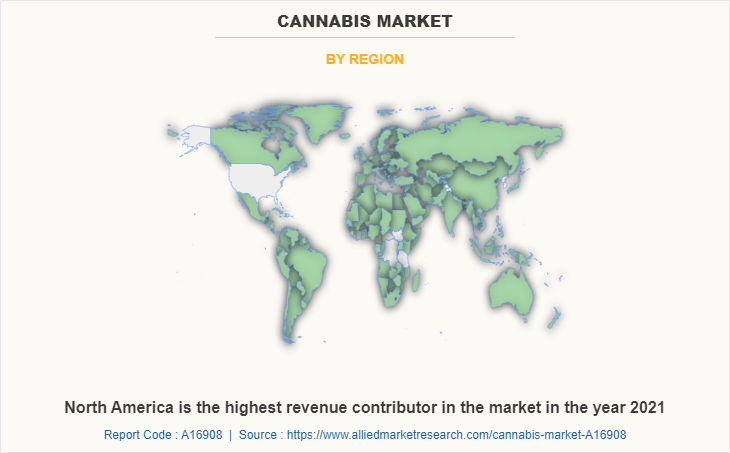
Competitive Landscape
The major players analyzed for the cannabis market are Aurora Cannabis Inc., Tilray, Canopy Growth Corporation, Cresco Labs, Curaleaf, Ecofibre Limited, Green Thumb Industries, Hexo Corporation, INDIVA, Maricann Inc., Medical Marijuana Inc., MME LLC., Organigram Holdings Inc., Stencocare, and Harvest Health & Recreation, Inc. Key players operating in the market have adopted product launch, business expansion, and mergers & acquisitions as key strategies to expand their cannabis market share, increase profitability, and remain competitive in the market.
The official agreement between Aphria Inc. and Tilray, Inc. (Canada) to merge their companies and establish the largest cannabis corporation in the world was signed in December 2020. A whole range of branded Cannabis 2.0 goods would be available in Canada due to the Combined Company's low-cost production, processing, and cultivation capabilities. Quatreau is a new range of CBD-infused beverages that Canopy Growth Corporation introduced in November 2020. These naturally flavored sparkling waters come in both balanced (CBD + THC) and CBD-only varieties. As an alternative to alcoholic beverages, sugary, caffeinated beverages, and other drinks, the company launched this line of products.
Key Benefits for Stakeholders
- This report provides a quantitative analysis of the market segments, current trends, estimations, and dynamics of the cannabis market analysis from 2021 to 2031 to identify the prevailing cannabis market opportunities.
- The market research is offered along with information related to key drivers, restraints, and opportunities.
- Porter's five forces analysis highlights the potency of buyers and suppliers to enable stakeholders make profit-oriented business decisions and strengthen their supplier-buyer network.
- In-depth analysis of the cannabis market segmentation assists to determine the prevailing market opportunities.
- Major countries in each region are mapped according to their revenue contribution to the global cannabis industry.
- Market player positioning facilitates benchmarking and provides a clear understanding of the present position of the market players.
- The report includes the analysis of the regional as well as global cannabis market trends, key players, market segments, application areas, and market growth strategies.
Cannabis Market Report Highlights
| Aspects | Details |
| By Product Type |
|
| By Compound |
|
| By Application |
|
| By Region |
|
| Key Market Players | Organigram Holdings Inc., Curaleaf, INDIVA, Canopy Growth Corporation, Maricann Inc., medical marijuana inc., Harvest Health & Recreation, Inc, Aurora Cannabis Inc., Cresco Labs, Stenocare, HEXO Corp., Tilray, Ecofibre Limited, Green Thumb Industries, MME, LLC. |
Analyst Review
The perspectives of the leading CXOs in the cannabis industry are presented in this section. The CXOs claim that cannabis is a psychotropic substance that is derived from the cannabis plant, which belongs to the family Cannabaceae. It has been utilized medicinally for a number of years and has a wide range of applications in the treatment of many different conditions.
According to CXOs, factors that support market expansion include the legalization of cannabis in a number of places, improved consumer knowledge of the drug's health advantages and expanding medical uses, and the development of novel products with expanded R&D activities. Furthermore, cannabis legalization in Asia-Pacific is expected to create a lucrative opportunity for market growth. However, complex regulatory structure for the usage of cannabis, and social stigma related to cannabis are expected to hinder growth of the market.
The CXOs further added that North America are expected to offer lucrative opportunities to the market during the forecast period, owing to legalization of cannabis in both the U.S. and Canada for medical and recreational purposes and increase in research and development (R&D) activities in the medical applications of cannabis.
The global cannabis market size was valued at $25.7 billion in 2021, and is projected to reach $148.9 billion by 2031
The global Cannabis market is projected to grow at a compound annual growth rate of 20.1% from 2022 to 2031 $148.9 billion by 2031
The major players analyzed for the cannabis industry are Aurora Cannabis Inc., Tilray, Canopy Growth Corporation, Cresco Labs, Curaleaf, Ecofibre Limited, Green Thumb Industries, Hexo Corporation, INDIVA, Maricann Inc., Medical Marijuana Inc., MME LLC., Organigram Holdings Inc., Stencocare, and Harvest Health & Recreation, Inc.
Region wise, North America dominated the market with the largest cannabis market share during the cannabis market forecast period.
Increase in legalization of cannabis in various regions, Surge in use of cannabis for therapeutic purposes
Loading Table Of Content...



